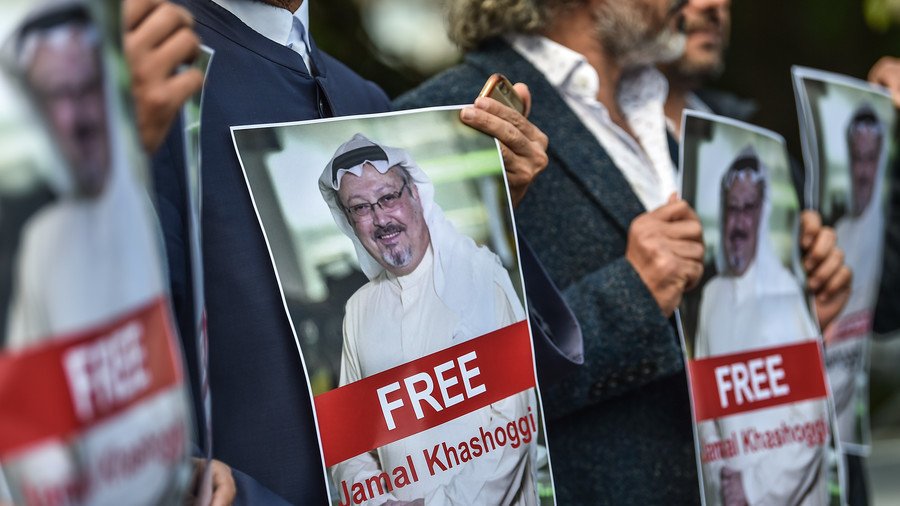'They all take Saudi money': Suspected murder of WaPo columnist by Saudi Arabia ignored by UK press

WikiLeaks has hit out at UK newspapers which have been curiously circumspect about the alleged murder of Washington Post columnist Jamal Khashoggi inside the Saudi consulate in Turkey last week.
The whistleblower organization tweeted that no British newspaper had led their Monday front pages with news about Khashoggi’s suspected murder despite the fact that news agencies like the Associated Press and Reuters were all reporting on the story — and suggested that the lack of interest from the UK papers was due to the fact that they “all take Saudi money”.
No UK paper today led with the diplomatic crisis over the alleged murder and dismemberment of Washington Post columnist & journalist #JamalKashoggi inside the Saudi consulate in Istanbul despite AP and Reuters newswires on the subject. All take Saudi money https://t.co/q0Gu9yjgA7pic.twitter.com/H05mUzbKLG
— WikiLeaks (@wikileaks) October 8, 2018
Fears have been growing over the fate of the missing Saudi dissident journalist who writes opinion columns for the Washington Post. Khashoggi was last seen visiting the Saudi consulate in Istanbul last Tuesday and Turkish officials have claimed that initial investigations indicate he was murdered while inside the building.
WikiLeaks also pointed out that the incident has so far prompted no reaction from US President Donald Trump or Secretary of State Mike Pompeo.
The suspected killing and dismemberment of Washington Post columnist and US resident #JamaKhashoggi by Saudi Arabia has so far seen silence from Donald Trump and U.S. Secretary of State Pompeo.
— WikiLeaks (@wikileaks) October 8, 2018
Khashoggi had been intending to obtain a document to certify that he had divorced his ex-wife in order to be able to marry his Turkish fiancée, Hatice Cengiz, who reportedly waited outside the building for 11 hours when he did not return. Turkish officials believe that the journalist was killed inside the building and later removed by a 15-person Saudi team that arrived at the consulate on Tuesday and returned to Riyadh the same day.
Saudi Arabia has denied the accusation and Turkish President Recep Tayyip Erdogan said he still remains “positive” about the investigation.
WikiLeaks weren’t the only ones taking note of how British media have been covering the story in a surprisingly calm and low-key manner, however. Some on Twitter made comparisons to how the UK papers had covered the recent alleged murder of Russian journalist Arkady Babchenko, who turned out to be alive and playing an elaborate trick on the media.
I remember when the British media gave front-page coverage to the "murder" of Arkady Babchenko. Who is, of course, still alive and well in Kiev. https://t.co/scITx2Xf7v
— Bryan MacDonald (@27khv) October 8, 2018
Our media were more vocal about the murder of Arkady Babchenko, although it didn't actually happen. pic.twitter.com/WgdNOShprk
— Aran Lewis (@aranmlewis) October 8, 2018
Others suggested that the British media was probably too busy trying to find a way to blame Putin for the murder or seeking out the next alleged victim of a Russian “Novichok attack” to look into the Khashoggi story.
That's because they haven't found a way to blame Russia for it yet
— JudaZ (@JudaZuk) October 8, 2018
@FarEasterner Im not surprised at all, their to busy concocting the next Novichok attack or cyber attack is the latest. The Novichok one's getting a bit worn out now 🙄. We don't want the " Great British public " thinking to much 😴💤💤💤💤💤💤 pic.twitter.com/PKiBA6Ufer
— Kevin (@bolshevik1953) October 8, 2018
Some pointed out that the Saudis are the “international untouchables” due to their close relationships with the US and UK governments. While the Guardian did run a column about Khashoggi on its front page, some Twitter users noted that it seemed like the newspaper was trying to downplay the story by not making it the main focus.
Let's make a thought experiment, how would that note look of it if it was an option to blame Putin?
— Friendlybus (@friendlybus) October 8, 2018
You can clearly see they want to downplay this. We know that our allies are allowed to do as they please if they are dancing to our tunes on the international stage.
— XXX ☀️ (@BloodyRain111) October 8, 2018
In 2016, Reporters Without Borders published information detailing how Saudi Arabia “manipulates foreign media outlets” in order to “project a positive image of the kingdom internationally”. RSF wrote that a series of cables between Saudi embassies and the Saudi foreign ministry (made public by WikiLeaks) revealed that “extraordinary initiatives” were considered by Riyadh in an attempt to rehabilitate its international image.
The organization wrote that Saudi Arabia “channels funds to media organizations all over the world” including the UK — and that the funding usually takes the form of outright donations or the buying up of thousands of subscriptions, as was the case when a struggling Lebanese TV network adopted a pro-Saudi editorial policy after taking a $2 million bailout from Riyadh.
In another incident, the London-based Financial Times was forced to withdraw its Saudi correspondent and close its Riyadh bureau after the government accused the paper of publishing “lies” about the country. In 2017, Saudi investor Sultan Muhammad Abuljadayel bought a 30 percent stake in the Independent newspaper, which also prompted concern that the paper would not be truly independent anymore.
Think your friends would be interested? Share this story!














